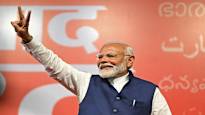However, according to the forecast, Modi’s BJP party is not going to get a simple majority in the lower house of the parliament on its own.
18:10•Updated 19:15
In India, the Prime Minister Narendra Modi has declared its third consecutive victory in the country’s parliamentary elections. Modi commented on the result of the election on the messaging service X, describing the number of votes his coalition received as a historic display of strength in the history of India.
However, the number of seats for Modi’s BJP party and the coalition it leads seems to be shrinking.
In advance, a clear victory was expected for Modi and the BJP. According to the election forecast, for the first time in a decade, the BJP is not alone in getting a simple majority in the lower house of parliament. It would thus be more dependent on its allies than before.
– The voters have punished the BJP, commented an important opposition figure, the Indian Congress Party (INC) Rahul Gandhi to reporters on Tuesday.
When more than 95 percent of the votes had been counted on Tuesday, the BJP’s vote share was around 37 percent. This vote haul would give the BJP 240 seats, which would be a significant drop from the 303 seats in the last election.
With this result, the party and its coalition partners would gain at least 292 parliamentary seats, while 272 seats are needed for a majority in the lower house of the parliament.
The opposition’s result, on the other hand, seemed to exceed expectations. While the counting of votes was still in progress, the main opposition party INC was almost doubling its number of seats from 52 to 98. At its headquarters in Delhi, the mood was upbeat as the counting progressed.
– The BJP has not managed to get a large majority on its own, said the MP Rajeev Shukla for journalists.
– It is a moral defeat for them.
Voter turnout decreased
About 642 million people went to the polls in the six-week election. Although there is a huge number of votes, the counting of votes was expected to take place quickly, as the voting took place electronically.
The final result was expected to be known no later than the night between Tuesday and Wednesday.
The voting percentage of the elections was reported to be 66.3, which is about one percentage point lower than in the previous elections in 2019.
The reason for the decrease in voting activity is considered to be that no real challenger was found for Modi and the result was already considered certain in advance. In addition, India has been hit by a deadly heat wave, which has curbed the desire of Indians to go to the polls.
The development of democracy is worrying
Modi has been the Prime Minister since 2014 and is very popular in India. In a Pew Research Center survey last year, nearly 80 percent of Indians viewed Modi favorably.
Recently, the opposition has not seemed to be a counter force to the BJP. Opposition politicians have also been subject to criminal investigations, which have been considered politically motivated by the opposition. For example, AAP party leader Arvind Kejriwal was arrested in the spring on money laundering charges.
Kejriwal was allowed to campaign during the election, but had to return to jail on Sunday. He vowed to continue his fight behind bars.
Non-governmental organizations have been concerned about India’s democratic development. US-based Freedom House said this year that the BJP has “increasingly used government institutions against its political opponents”.
Discrimination against certain minorities, especially Muslims, is also seen to have intensified under the rule of the Hindu nationalist Modi. Even during the elections, Modi made sharp comments about the Muslim minority.
